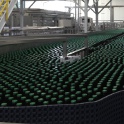|
I found this article to be a pretty good read about the DIY movement and it's relation to homebrewing: http://www.slate.com/articles/technology/future_tense/2012/02/home_brew_and_the_diy_innovation_movement_.html quote:I grew up watching MacGyver, whose titular hero we could consider the mascot of the DIY movement for his ability to craft unorthodox solutions using whatever materials are at hand. While most brewers are not primarily concerned with defeating threats to world peace and justice, MacGyver’s spirit of bricolage (recombining and repurposing whatever happens to be lying around) is pervasive in the home-brew community. Home brewers experiment with ingredients and processes, but they also design and fabricate their own equipment. Beer can be made on a stovetop or in a customized, handmade, arduino-controlled, fully automatic, trailer-mounted “brew sculpture.” Most all-grain brewers make their own “mash tun” (steeping vessel) out of picnic coolers, copper pipe, and various hoses and valves from the hardware store. Many convert commercial beer kegs into boil kettles that they perch atop turkey fryers (all of which are available dirt-cheap on Craigslist). The old soda kegs that have been phased out by the soft drink industry make for excellent home-brew equipment. Bricolage is important as we face the limits of our landfills because it allows us to reclaim, reuse, and repurpose materials that are otherwise destined to decay. I love this DIY attitude with the homebrew community, always coming up with new ways to do things.
|
|
|
|

|
| # ? May 30, 2024 08:51 |
|
I'd say you're not even guilty of a breach of contract. Most keg agreements I've seen treat the arrangement as a rental, with the deposit used as liquidated damages. I don't return the keg, I don't get my money back. The agreement usually serves to make sure the person buying is old enough, and tries to mitigate the shop's civil liability for alcohol related shenanigans. Sidebar: I will point out that in Wisconsin, it is a misdemeanor to "Intentionally fail to return any personal property which is in his or her possession or under his or her control by virtue of a written lease or written rental agreement after the lease or rental agreement has expired." The key here would be "intentionally", as well as the term of the agreement being defined as x weeks, with liquidated damages as a time boxed backstop. Never mind the practical difficulty of convincing a DA that a lazy college student is guilty of a misdemeanor for failing to return a keg and forfeiting their deposit. Wisconsin has a statute that makes it a misdemeanor for scrap dealers to buy an keg unless they have "made a diligent inquiry into whether the person selling the proprietary article has a legal right to do so, and, not later than one business day after purchasing the proprietary article, submits a report to a local law enforcement department describing the proprietary article and submits a copy of the seller's or deliverer's identifying information under subd. 1." I'm all for trying to stick it to SAB, but in reality they probably aren't feeling the burn. They likely hold the distributor responsible for the actual replacement cost. The distributor will then pass that responsibility on to the shop, as much as possible. The ultimate weight being carried by one of the three will be based largely on the relative market strengths of the players. SAB can make the distro responsible for the whole deal. Your local microbrewer cannot. So, if you liquidate a keg, do so from one of the big boys, but do so because it is less likely to hurt a small brewer, not because it is going to hurt the big one.
|
|
|
|
Bleston Humenthal posted:I'd say you're not even guilty of a breach of contract. Most keg agreements I've seen treat the arrangement as a rental, with the deposit used as liquidated damages. I don't return the keg, I don't get my money back. The agreement usually serves to make sure the person buying is old enough, and tries to mitigate the shop's civil liability for alcohol related shenanigans. Moreover, the deposits has nothing to do with actual damages; I've never signed a keg rental agreement that specified deposits count as liquidated damages. All it means is that the creditor is under-secured on a debt. Angry Grimace fucked around with this message at 02:15 on Mar 6, 2012 |
|
|
|
Fraud is hard to prove, particularly fraud in the inducement, and particularly when you have damages to cover breach built in. DON'T LOOK AT THIS THREAD PROSECUTORS. Arguing that you tricked the other person into entering a contract they wouldn't have entered into but for the fraud, when there is baked in cost to cover loss, is approaching impossible. It's not a loan, but I appreciate your analogy. The fact that it's a bad contract for them speaks only to the fact that it's a bad contract, but it doesn't impose obligations on your actions. Banks default when it's favorable, so should you. The counterargument is that low keg deposits encourage higher volumes of beer sales. If deposits covered actual loss, it would hurt sales. They're willing to risk a partially secured arrangement to increase volume. The breweries are concerned with theft and scrap sales, and the deposit cost reflects that. (scrap value of a keg is ~$12, deposits are usually higher than that). They're not concerned with the random homebrewer. Bleston Humenthal fucked around with this message at 02:57 on Mar 6, 2012 |
|
|
|
Bleston Humenthal posted:Fraud is hard to prove, particularly fraud in the inducement, and particularly when you have damages to cover breach built in. DON'T LOOK AT THIS THREAD PROSECUTORS. Arguing that you tricked the other person into entering a contract they wouldn't have entered into but for the fraud, when there is baked in cost to cover loss, is approaching impossible. This is all really far afield from home brewing though. Don't steal kegs, kids. Angry Grimace fucked around with this message at 03:10 on Mar 6, 2012 |
|
|
|
Wrong. Take advantage of poor contracting practices. They'd do the same for you!
|
|
|
|
Brewing a stout on a Monday night! gently caress you snow, I don't care if it won't be ready until the end of the month, this winter is done.
|
|
|
|
Bleston Humenthal posted:Wrong. Take advantage of poor contracting practices. They'd do the same for you! This is a pretty lovely thing to do.
|
|
|
|
LeeMajors posted:Also, at least here in SC, there was a new tagging system put in place that requires you keep this paper tag on the keg. If it is lost or falls off, you lose your deposit and have to keep the shell (I think our deposit is 50 or 55). This seems like a system designed -=- I am looking at doing this Brew In A Bag thing, since I have the funds at the moment for equipment or beer but not both. In fact, I only have the funds for beer because I'm instructed to make some beers my wife will enjoy. Luckily, I like much the same beer spectrum. Can I accomplish the Dragon Stout recipe in Clone Brews using that method? Am I in for a world of anger and pain? I'm a giant of a man so getting it out of the pot won't be a problem, my concerns would be: 1. Will heating it on an electric stove be enough BTUs? 2. What to make the bag out of. Why wouldn't cheesecloth work? It's specifically intended for basically this activity but with more protein and some fat. 3. Some of the stuff in the recipe, I don't know what I'm shopping for, like the grain bill is clear right up to "2oz Roasted Barley". Er, what, any old roasted barley? Not really specific enough when Northern Brewer is selling probably 20 types in multiple flavors. Maybe this is a "to taste" thing, as long as it's some type of barley? Just seemed odd for a book about trying to mimic existing flavors to have something so uncertain, so I assume I'm missing something there. Also, more generally, can I bottle wort after the boil for future use? I assume there's some risk of wild yeast with that, although I'd think it'd be minimized by standard refrigeration and proper sanitization. Or, to go to the land where nothing grows: are there any bad/interesting side effects of freezing wort? Splizwarf fucked around with this message at 05:01 on Mar 6, 2012 |
|
|
|
Quick, we need some panty unwadder in here! Less moral indignation that no one gives a poo poo about and more talk about beer.
|
|
|
|
Splizwarf posted:This seems like a system designed 2) You can use those 5 gallon paint straining bags that cost $4 for 2 at Home Depot for BIAB. 3) My understanding is that "roasted barley" in a recipe refers to unmalted barley - it is usually sold simply as "roasted barley." You may be confusing roasted malts with roasted barley. The difference is that roasted barley is unmalted, but the various roasted malts (i.e. patent malt and chocolate malt, etc.) are malted barley that is then roasted in a drum roaster.
|
|
|
|
Jesus christ no one cares at this point: if you have an excellent counterargument, take it to PM or irc or whatever, I'm getting LF flashbacks in level of moral discourse. On a completely different note: so as i said earlier, I froze my latest batch of Alt. The beer might be drinkable I guess (but it's probably another two days away from being thawed) is there any hope for the yeast? It's just annoying since my LHBS has to special order WLP036 because I guess it isn't a style everyone is clamoring to do??
|
|
|
|
Splizwarf posted:3. Some of the stuff in the recipe, I don't know what I'm shopping for, like the grain bill is clear right up to "2oz Roasted Barley". Er, what, any old roasted barley? Not really specific enough when Northern Brewer is selling probably 20 types in multiple flavors. Maybe this is a "to taste" thing, as long as it's some type of barley? No, roasted barley is black as hell, unmalted barley. It's usually 500L or so. This is the stuff you want: http://www.northernbrewer.com/shop/english-roasted-barley.html
|
|
|
|
Splizwarf posted:] I don't know what you have in mind specifically, but yes you can. If you want to use unfermented wort instead of corn sugar to bottle condition that same batch, it's called Krausening (not to be confused with Krausen) Noonan in New Brewing Lager Beer advocates this for bottle conditioning lagers. As far as freezing wort: I'll let you know in a couple of days.
|
|
|
|
Darth Goku Jr posted:I don't know what you have in mind specifically, but yes you can. If you want to use unfermented wort instead of corn sugar to bottle condition that same batch, it's called Krausening (not to be confused with Krausen) Noonan in New Brewing Lager Beer advocates this for bottle conditioning lagers. I looked it up on Google and mostly got results about using liquid nitrogen to freeze off warts  , but the guys that were doing freezing wort were mostly doing it to make yeast starters. If so, the one common sense thing I would say is not to fill an entire beer bottle unless you want it to explode in your freezer. , but the guys that were doing freezing wort were mostly doing it to make yeast starters. If so, the one common sense thing I would say is not to fill an entire beer bottle unless you want it to explode in your freezer. As for the krausening thing, isn't wort way less fermentable than dextrose? It seems like that would actually change the flavor of your beer. Angry Grimace fucked around with this message at 06:18 on Mar 6, 2012 |
|
|
|
Angry Grimace posted:As for the krausening thing, isn't wort way less fermentable than dextrose? It seems like that would actually change the flavor of your beer. The amount is actually pretty small, so it matters less than you would think. As an example, Sierra Nevada krauesens exclusively.
|
|
|
|
Angry Grimace posted:I have to assume he means like a small volume for yeast starters or something, right? I can't fathom the logistics involved in freezing 5 gallons of anything. Here are the logistics to freezing 5 gallons of anything: Step 1: Have a chest freezer and temperature control unit Step 2: Brew a beer. Step 3 Don't notice as you're cold conditioning the beer that the probe fell out of the freezer and is constantly thinking it's 60 degrees meaning it's going full blast at 20 degrees. Step 4 hate yourself as you open the freezer. Step 5 it's been two drat days already and I'm still thawing this mess holy hell. Step 6: don't use warm water running over it to thaw it it'll just make it build up pressure super-quick under your cap. Step whatever-I'm-currently-in: become grateful that you used a better bottle with some headspace instead of glass. Step after-that-last-step learn English grammar and syntax better
|
|
|
|
First broken hydrometer. Cat walks up to Hydrometer sample container, knocks it straight off the table and just looks up like "what? On the plus side, the beer (first All-Grain), although slightly higher gravity compared to what I was expecting (because I guess I didn't sparge enough volume), seems quite tasty, if maybe a bit bland. It's just some 2 row, vienna malt, half a pound of crystal 10 and about 2 oz. of Amarillo. The only problem I see is that it kind of looks like cloudy pee at the moment. Angry Grimace fucked around with this message at 10:34 on Mar 6, 2012 |
|
|
|
The main reason I was wondering was coming from a catering background where everything's easier and more efficient when done in big sessions. If wort can be successfully stored in a refrigerator, then I could just make several worts all day one day, then always have something waiting when I wanted to get another fermentation pail going; ie Wort Day on Sunday and then pitch a pail after dinner every day for two weeks. I envisioned freezing it in a chest freezer in a Better Bottle with a gallon of headroom. A full-size chest freezer will hold 6 or 8 (I think) depending on if it's deep enough to lay 2 of them sideways between the necks of the other 6. That was more of an academic question, though, I really just want to be able to refrigerate it so I don't have all my fermentation pails finish up on one day.
|
|
|
|
Splizwarf posted:I envisioned freezing it in a chest freezer in a Better Bottle with a gallon of headroom. A full-size chest freezer will hold 6 or 8 (I think) depending on if it's deep enough to lay 2 of them sideways between the necks of the other 6. That was more of an academic question, though, I really just want to be able to refrigerate it so I don't have all my fermentation pails finish up on one day. Refrigerating your wort will not stop it from getting infected, so that's definitely out. In theory freezing it should work, but there's a guy in my homebrew club that used a pressure cooker to can a bunch of mason jars of wort for starters and he eventually got infections from those so I'd be weary of it. What I don't get is why you're concerned about your beer finishing all at once, and the fact that you're planning on freezing like 30-40 gallons of wort. Even with a 10 gallon setup making 40 gallons of wort would take a long rear end time. As far as all your beers finishing at once, you don't have to leave every beer in primary for the exact same amount of time. You mentioned freezing your wort then pitching new yeast every day for a week, so if you have a couple beers finishing at the same time just stagger the bottling/kegging days, it won't hurt anything to let the beer sit for another few days. I really am confused by what your purpose for this is, do you really want to make like 30-40 gallons of beer in a two week timeframe?
|
|
|
|
Easy there, it's speculation. I'm mostly trying to find out is where the edges/limits are. What techniques can I apply from my previous related experience? What are my options? This isn't something I'm currently able go out and do tomorrow. That being said, Josh Wow posted:I really am confused by what your purpose for this is, do you really want to make like 30-40 gallons of beer in a two week timeframe? For some background, I'm currently cooking, brewing, and baking for 5 adults during the week, and between 15 and 40 on Sundays. We tend to go through about a case to a case and a half of craft beer, hard cider or homebrew in a week of dinners (and occasionally a bottle of wine); I believe in matching food and drink as well as possible and accordingly keep a wide selection in the second fridge. On Sundays, anything in that fridge or the garage is fair game for our guests. To answer your question: yes, probably at minimum six to eight times a year I'll want to do 40 gallons or so, and once a year I'll want to do at least triple that. I have a lot of helping hands available who want to participate and also like beer. 40 gallons is only 15 or 16 cases, which isn't a lot when everyone takes home a case or two. Participation is limited only by floorspace in the (nice-sized) kitchen.
|
|
|
|
why do you want to boil a bunch of batches of wort on one day and then stagger your bottling days? they're roughly the same amounts of effort
|
|
|
|
I can't see storing that much wort working well, no matter what temperature it's kept at. That's a level of production that is pretty handily over the capacity of most brew rigs, but something could be cobbled together if it were desired. I have not seen an off-the-shelf solution that is capable of such large batches. I think the biggest is Morebeer's 20-gallon rig, which is uses 26-gallon kettles. Something custom could be put together by a dedicated tinkerer, though - the Maltose Falcons' club rig is based on three 40-gallon stainless steel pool filter housings, so it's probably capable of 20 to 30 gallons or so of actual output per batch. I'd look at something like that, based either on scavenged vessels or gargantuan stockpots.
|
|
|
|
You're probably aware of this, but what it sounds like you want to do will probably be extremely questionable legal department. Especially if this is part of a catering business... Anyway, if you are going to brew 40 gallons of wort at once, you might as well ferment all of it. A lot of homebrew benefits from extended bottle conditioning. From my perspective, you are adding tons of risk for no gains. The thing about bottling is that it's a pain in the rear end and you're going to be better off doing as many bottles as you can at once. Since bottling is a process, it benefits from the "assembly line" perspective, having a person to wash/sanitize, a person to fill, and a person to cap will allow you to do lot of bottles quickly. With most bottling setups it's just more efficient to get it all done at once. As for constancy, I think you'd be better off just using good practices to brew consistently brew good beer then to try and keep a steady flow of consistently tasting beer.
|
|
|
|
Jo3sh posted:I have not seen an off-the-shelf solution that is capable of such large batches. I wasn't thinking about huge single batches, I wasn't very clear (sorry!). I was thinking several different smaller batches done same-day. In my experience, setup and teardown for a big thing like this is a given time-sink to be worked around by trying to fit as much in between as practical. To put it another way, making two batches instead of one may increase the setup and teardown time but it certainly won't double it, and if they're cooking at the same time on different burners they won't double the cook time either. Daedalus Esquire posted:You're probably aware of this, but what it sounds like you want to do will probably be extremely questionable legal department. Especially if this is part of a catering business... This isn't an issue in Virginia, the homebrewing limit is 200 gallons/year/person; the precedent is that each person involved can take credit for up to 200 gallons, so two people working together can produce 400 gallons/year and so on scaling upward. This isn't part of a catering business (and won't be done for money). However, I worked catering from about age 12 to age 24, so it's often the lens I'm seeing the world through. I have no loving idea how to cook for two. Splizwarf fucked around with this message at 17:19 on Mar 6, 2012 |
|
|
|
Splizwarf posted:I wasn't thinking about huge single batches, I wasn't very clear (sorry!). I was thinking several different smaller batches done same-day. In my experience, setup and teardown for a big thing like this is a given time-sink to be worked around by trying to fit as much in between as practical. To put it another way, making two batches instead of one may increase the setup and teardown time but it certainly won't double it, and if they're cooking at the same time on different burners they won't double the cook time either. http://www.homebrewtalk.com/f13/exploring-no-chill-brewing-117111/ This guy did no-chill brewing and stored his wort for 8 weeks without issue, apparently. I guess you just take the freshly boiled (still almost boiling) wort and put it in a sanitized jerry can type fermenter and squeeze out the air, the heat sterilizes the sanitized inside and allows you to store it long-term. Magua fucked around with this message at 17:51 on Mar 6, 2012 |
|
|
|
Splizwarf posted:I wasn't thinking about huge single batches, I wasn't very clear (sorry!). I was thinking several different smaller batches done same-day. In my experience, setup and teardown for a big thing like this is a given time-sink to be worked around by trying to fit as much in between as practical. To put it another way, making two batches instead of one may increase the setup and teardown time but it certainly won't double it, and if they're cooking at the same time on different burners they won't double the cook time either. The only possible way I can see for you to do a bunch of small batches in the same day in the quantity you want to do would be to do brew in a bag method and also no chill method. With this way you would only be limited by the amount of burners and pots you have that can boil 7 or so gallons of wort, and the amount of people you have helping you. With any other way you'll run into a ton of problems. With a real mash tun you can only brew one batch at a time and the mash takes 75-85 minutes. You'd have the same problem with a wort chiller in that you can only chill one batch at a time and that takes 10-20 minutes. So to accomplish this you'd just need as many mesh bags and as many of those jerry cans the no chill guys use as batches you want to do in a day. You mash in your boil pot, get done with your boil and just dump it in the jerry can and then the next day or however long it takes to cool your wort you pitch your yeast. I personally think the quality of the beer would kind of tank, and you're going to use a lot more grain to do single pot BIAB than you would with a regular mash tun but I've never tried a no chill beer and haven't personally done BIAB so I can't say that with any authority.
|
|
|
|
Why not run multiple chillers? It's just copper tubing with hose fittings on the ends, not too pricey. Can anyone who's done BIAB speak to the possibility of needing to increase the grain bill? I had planned on buying supplies from Northern on my lunch break today for BIAB. Splizwarf fucked around with this message at 18:20 on Mar 6, 2012 |
|
|
|
I'm slowly catching up with the rest of the thread, so apologies if this has been asked a million times. I bottled my first batch last week, and i'm thinking of cracking one today to see how the carbonation is coming. Am I pretty safe to try one at this point? A week from today will be the two week mark, and the official 'coming out party' for my Imperial IPA  Looking at some advice from earlier in the thread, i'm already gearing up to start batch #2 and am super pumped. I have a feeling this is going to be a really really fun hobby, and will hopefully cut down my habit of buying 2 craft beer six-packs a week!
|
|
|
|
Splizwarf posted:Why not run multiple chillers? It's just copper tubing with hose fittings on the ends, not too pricey. Multiple chillers is technically feasible to do if you have multiple water sources or get a hose splitter and have enough water pressure, it's just with the number of batches you're trying to do in a day you would either need to build 3-4 chillers and be able to run them simultaneously or stagger your batches so you're only using 1-2 chillers at a time which would be a logistical nightmare. If you do single pot BIAB (meaning you don't sparge at all), which is what I was saying you would need to do earlier to run like 3-4+ batches at a time, you will definitely need to up your grain bill if the recipe is designed for a traditional mash tun.
|
|
|
|
Josh Wow posted:If you do single pot BIAB (meaning you don't sparge at all), which is what I was saying you would need to do earlier to run like 3-4+ batches at a time, you will definitely need to up your grain bill if the recipe is designed for a traditional mash tun. How should I approach calculating that? The BIAB how-to that I linked a couple posts ago doesn't mention changing the grain bill. Why would I need to increase?
|
|
|
|
Splizwarf posted:How should I approach calculating that? The BIAB how-to that I linked a couple posts ago doesn't mention changing the grain bill. Why would I need to increase? I don't really feel like taking the time to figure out how much more grain you'd use, but you have to up the grain bill if you don't do a sparge because in a nutshell the sparge rinses sugars off the grains. When you don't do a sparge you leave those sugars behind, so you have to add more grain to make up for the sugars that you would have gotten from sparging.
|
|
|
|
If you use any brewing software, basically take the "efficiency" field and knock it way down, to like 50%. Then up the amount of extract or base malt until you are back at your desired OG. That should be a good ballpark starting point for adjusting your recipe for no-sparge.
|
|
|
|
I regularly get 75-80% efficiency with a fine crush with a no sparge BIAB. On a standard 1.050-1.060 gravity, anyway. I just use a standard grain bill.
|
|
|
|
Magua posted:I regularly get 75-80% efficiency with a fine crush with a no sparge BIAB. On a standard 1.050-1.060 gravity, anyway. I just use a standard grain bill. I get this as well, even with the regular crush from my brewshop. Technically, BIAB is not no-sparge, the sparge water is just already in the mash. Brewsmith has BIAB profiles, I haven't used it that much though. There are spreadsheets at http://www.biabrewer.info/ you can use. Here is one: http://www.biabrewer.info/viewtopic.php?f=25&t=189 This one is a work in progress but I found it to be very accurate. I had to tweak it to work in Openoffice, the one posted only works in excel I think: http://biabrewer.info/viewtopic.php?f=74&t=1066
|
|
|
|
Northern just offers "crushed", should I try to ask them for a finer crush or will it be sufficient?
|
|
|
|
Splizwarf posted:Northern just offers "crushed", should I try to ask them for a finer crush or will it be sufficient? I ordered from Brewmasters Warehouse before I got a mill, so I'm not sure how fine their crush is. You can try to ask them to double crush it, but I don't know if that's needed. You do get much better efficiency with a fine crush, though.
|
|
|
|
I have some food milling equipment, worth running it through?
|
|
|
|
I pitched a yeast starter created from harvested yeast last night and there still isn't any activity coming from the primary (holding steady at 61*). I aerated it really well after pitching and checked the bucket lid to make sure it was tight. I took a peek after about twelve hours and it has spots of yeast poking up through the foam from aerating, but I still think I underpitched. Should I try pitching more yeast?
|
|
|
|

|
| # ? May 30, 2024 08:51 |
|
Splizwarf posted:I have some food milling equipment, worth running it through? If it was me I would use the standard crush to start with and see what efficiencies you get. There is good info here about troubleshooting your efficiencies with a nice spreadsheet that can show you where your losses are. From there you can decide if you need/want to ask the store to double crush, or look into your own solutions.
|
|
|



















